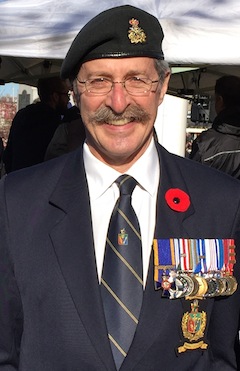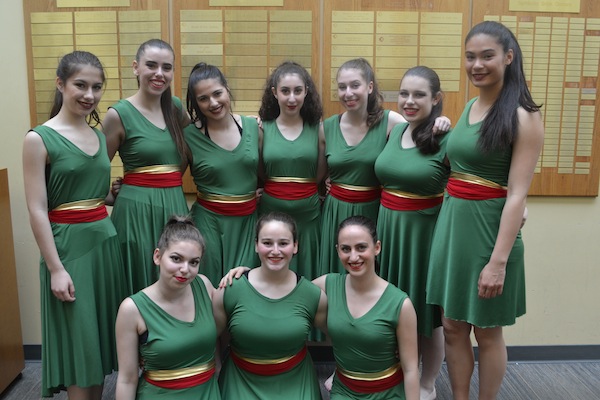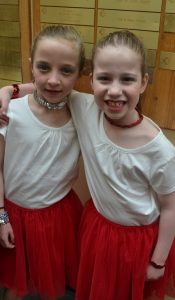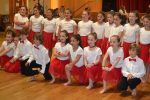The Grade 1-3 class of Israeli dancers from Richmond Jewish Day School who participated in Festival Ha’Rikud on May 14. See more photos below. (photo by Lauren Kramer)
***
In every community, and ours is no exception, there are folks who frequently capture the spotlight for their work while others quietly get things done behind the scenes, flying below the media radar. In our Kibitz & Schmooze profile, we try to highlight members of our community who are doing outstanding, admirable and mention-worthy work out of view of the general public. If you know of profile subjects who fit this description, please email [email protected].
For Victoria resident Ed Fitch, the Canadian Armed Forces did more than make him a major-general. It made him more of a Jew.
Growing up in Montreal, Fitch says he took his Judaism for granted. At 17, when he joined the armed forces, it was a wake-up call. “I realized if I didn’t respect my own religion, how could I expect anyone else to? It was the beginning of my journey to become more Jewish,” he says.

Fitch was open about his Judaism and, over the course of an illustrious career that saw him rise high through the ranks, he helped create institutional change that would benefit other Jews, too. There had last been a Jewish chaplain in the forces in 1945, and Fitch was determined to change that. “I made a proposal to the armed forces’ governing body for chaplains in 2003, and I asked them, do you want to be followers or leaders? Build it, and they will come!”
The result was the appointment of Rabbi Chaim Mendelsohn to chaplaincy and, a few years later, the succession of Rabbi Captain Lazer Danziger. “Rabbi Danziger will be leading Shabbat services at Alberta’s Area Support Unit Wainwright (one of the country’s busiest army bases) … with a full minyan!” Fitch says with delight.
Fitch’s proposal didn’t just benefit Jews in the armed forces. Today, there’s a Muslim chaplain serving, as well.
Fitch served Canada for 43 years in a career that spanned from 1966 through to his semi-retirement in 2006. During that time, he received the Meritorious Service Medal for his work in the former Yugoslavia, facilitating NATO’s entry. He was also appointed an Officer of the Order of Military Merit in June 1999, the military equivalent of the Order of Canada.
As a colonel in the mid-1990s, Fitch was in the former Yugoslavia when the United Nations’ peacekeeping force, of which he was part, was contracted out to NATO. “It was an astounding change that had never happened before: an in-place transition from a UN command to a NATO command,” he reflects. “It was December 1995 when we all removed our UN badges and rolled over to this NATO force, with a completely different set of rules. As a combat engineer on the land force, I was the guy on the ground preparing for the incoming 50,000 troops who needed minefields cleared, bridges built and accommodations created.”
At 50, Fitch was promoted to brigadier general and was in command of a division of 12,000 members of the military and civilians, and a land mass that stretched from Thunder Bay to Vancouver Island and up into the Arctic. “My staff enjoyed telling me that it was the largest military district in the world – happily, a fairly benign one,” he jokes. The division’s responsibilities were domestic – attending to forest fires and tornadoes – as well as deployed operations, and Fitch regularly prepared troops of 1,000 to 2,000 to fly to Bosnia, Afghanistan and other countries where they were needed.
In 2001, Fitch was appointed major-general, a rank third from the top in the Canadian Armed Forces, and relocated to Ottawa. Here, he supervised planning the restructuring and modernization of Canada’s army reserves.
Fitch had just relocated to Victoria when, in 2006, he was called up from the Supplementary Reserve in support of Operation PODIUM, the Canadian Armed Forces’ support to the 2010 Vancouver Winter Olympics. His primary duty was the leadership of the Games Red Team, a project in which he and his team synthesized a terrorist cell and created practice scenarios to prepare Olympics planning staff for a potential attack.
“Our goal was to improve the capacity of the armed forces to deal with some potentially devastating situations,” he explains. “The model behind it is, train hard, fight easy. We disciplined ourselves to be real and started giving Olympics planning staff gentle problems, upping the ante to present them with tougher and tougher problems.”
When asked if he ever experienced antisemitism in the armed forces, Fitch says that his rise through the ranks is evidence there is none. “What the forces did with me proves there is no antisemitism,” he says. “I think the Canadian Armed Forces is the purest meritocracy in this country.”
After the Winter Olympics, when his full retirement came into effect, Fitch dedicated himself to community work. As a qualified civil engineer, he was instrumental in helping with the construction of the Centre for Jewish Life and Learning (Chabad), the first new synagogue to be built on the island since 1863. He volunteers with the Victoria Jewish Cemetery Trust and the Vancouver Island Chevra Kadisha, and serves as chair of the Centre for Israel and Jewish Affairs’ national community security committee. He’s been house committee chair and treasurer of Congregation Emanu-El and a board member of the Jewish Historical Society of British Columbia.
***
The 14th annual Festival Ha’Rikud took place at the Jewish Community Centre of Greater Vancouver May 12-14 and Israeli dancers from Richmond Jewish Day School (RJDS), Vancouver Talmud Torah, Temple Sholom, Or Chadash, Orr Ktanim and a group from Miami entertained a packed house in two performances. The theme for this year’s festival was friendship and a celebration of Israeli culture in its Canadian context, in honour of Canada’s 150th birthday. Dancers delivered polished performances that testified to many hours’ practice and a great fondness for Israeli folk dancing.



